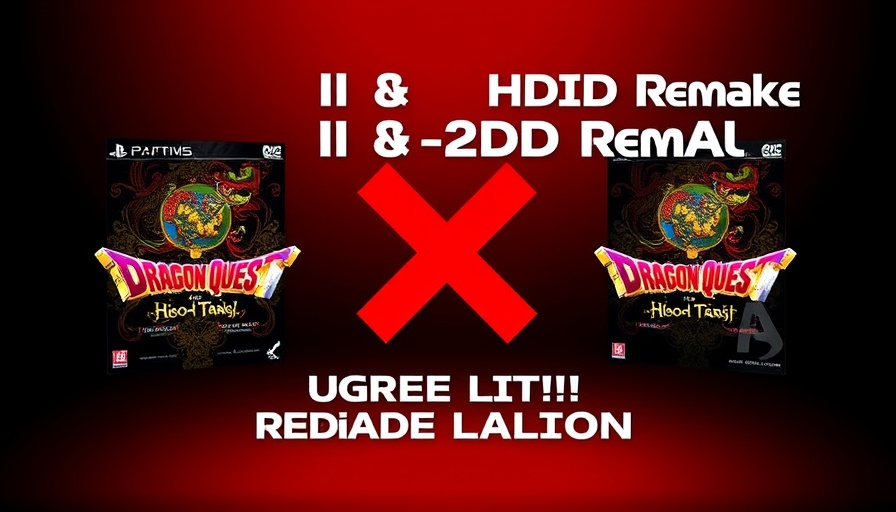
Understanding the Upgrade Dilemma for Gamers
As technology advances, gamers are frequently confronted with the challenge of transitioning between console generations, especially with beloved franchises. Square Enix's announcement that players of Dragon Quest I & II HD-2D will need to repurchase the games for the forthcoming Switch 2 has sparked outrage and concern among fans. This decision raises significant questions about consumer expectations and the ethics of game remakes in the console gaming industry.
What It Means to Buy Again
With Square Enix's recent statement that there’s 'no upgrade path...available or planned', players are left feeling taken advantage of. The concept of upgrading previously purchased titles has been a norm that many acknowledge in consumer electronics; yet, the gaming industry still follows a different playbook. This raises significant issues for long-term fans who invest their time and money into a series only to face the prospect of repaying full price for a title they already own.
The Psychology of Gamers
From a psychological perspective, this kind of approach can lead to feelings of alienation and mistrust within a community. Gamers often feel a sense of loyalty and connection to the franchises they love but find themselves frustrated when corporate decisions force them to reassess their financial commitments. The emotional investment in these games, coupled with a deep-rooted desire for value, creates a volatile market dynamic where companies must tread carefully.
Comparative Analysis with Other Franchises
Interestingly, this scenario isn't unique to Square Enix. For example, many other gaming companies have introduced tiered upgrade paths successfully, allowing previous customers certain benefits when a new iteration is launched. Titles like Final Fantasy VII Remake or Minecraft provide upgrades that integrate existing content, reducing the need for fans to pay again for content they have already enjoyed. Square Enix's strategy contrasts sharply with those alternatives, leaving players feeling undervalued.
Current Trends in Gaming Upgrades
The conversation around Dragon Quest I & II's upgrade path is part of a larger trend in gaming where companies need to balance profit motives with consumer loyalty. The recent performance of **next-gen consoles** indicates an industry trending toward backward compatibility and customer-centric strategies. Gamers are beginning to favor companies that value their return on investment, which begs the question: how long can publishers like Square Enix sidestep these considerations?
Impact on the Gaming Community
Developers must recognize the implications of their strategies on community sentiment. Every time a company springs such news, it creates ripples across social media and community forums. **Anger and frustration can lead to boycotts**, as many gamers are willing to stand in solidarity with their peers over perceived unfair practices. While Square Enix may hope to profit from this release, the potential damage to their relationship with the community could far outweigh any short-term gains.
Looking Toward the Future
The landscape of gaming and technology offers a wealth of exciting advances, particularly with the emergence of **cloud gaming** solutions, which bridge hardware gaps and provide access without additional costs. The reaction to Square Enix's announcement may encourage other publishers to reconsider their policies, shifting toward models that better support and reward their players.
What Can Gamers Do?
For gamers feeling disenfranchised by Square Enix's recent announcement, it’s essential to voice concerns directly. Engaging in community forums, chatting on social media platforms, or even contacting the company can increase visibility of these issues. The gaming community has a history of making noise when faced with corporate decisions that seem unempathetic. Together, fans can influence change, urging companies to take more consumer-friendly approaches in the future.
Conclusion and Call to Action
In conclusion, while Square Enix has decided to implement a tough-love approach towards their established fans, the gaming community deserves innovation that respects their loyalty and investment. As technology in gaming rapidly evolves, gamers should remain vocal and advocate for fair practices that enrich the gaming experience without the burden of repeated purchases. Share your thoughts and consider exploring new technologies or upcoming releases that demonstrate a commitment to consumer respect and enrichment.
 Add Row
Add Row  Add
Add 




 Add Row
Add Row  Add
Add 

Write A Comment